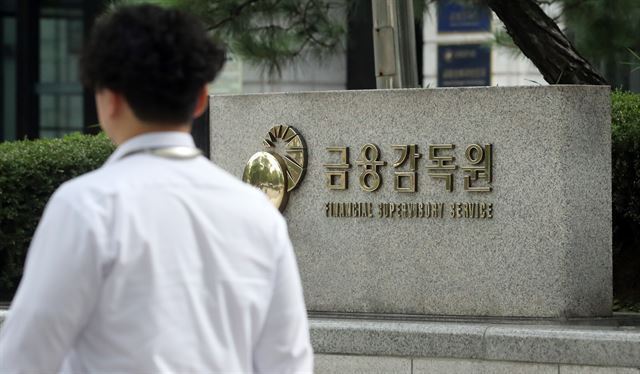
South Korean banks and their customers lost nearly 500 billion won ($428 million) from employees’ financial crimes -- including embezzlement and fraud -- in the last five years, data compiled by the nation’s financial watchdog showed Sunday.
Twenty local lenders saw losses worth a combined 488.4 billion won through 186 cases from 2016 to June this year, according to data submitted by the Financial Supervisory Service to Rep. Lee Young, a lawmaker of the main opposition People Power Party.
Of the total cases, those that happened under the roofs of the four major banks -- Shinhan, Woori, KB Kookmin and Hana -- accounted for some 60 percent, at 109 cases.
Annually, 2016 saw the greatest number of cases and amount lost -- 48 cases and 351.3 billion won. There were 21 cases that cost banks 3.1 billion won through June for this year.
Embezzlement accounted for nearly half of the pie, with 90 accumulated cases, while fraud accounted for 30.6 percent with 57 cases and breach of trust accounted for 14 percent with 26 cases. Theft accounted for 4.3 percent with eight cases.
But in terms of money, fraud dealt the heaviest blow to the institutions and its customers with 403.4 billion won -- 82.6 percent of the total.
Woori Bank saw the most financial crimes happening under its roof, with 33 cases in the cited period. KB Kookmin and Shinhan both came at No. 2 with 27 cases each and Hana ranked No. 3 with 22 cases. NH Nonghyup trailed with 19 cases.
The state-run Industrial Bank of Korea, however, lost the largest amount of money in the same period, with 15 cases worth a combined 133.7 billion won. Another state-run institution, Korea Development Bank came at No. 2 with five cases worth 129.8 billion won.
Despite efforts by the financial authorities to curb financial crimes committed by employees in both state-run and private institutions, new loopholes continue to be discovered with technological advances every year.
In April, it was found that an employee of Woori Bank embezzled 185 million won for personal investment in cryptocurrency. The employee was reportedly fired afterward.
“Most financial scandals in banks stem from the employees’ sense of moral hazard,” Rep. Lee said.
“It is crucial for the banks to establish solid standards for employee management and measures to curb recidivism through stricter punishments,” she added.
By Jung Min-kyung (mkjung@heraldcorp.com)
Twenty local lenders saw losses worth a combined 488.4 billion won through 186 cases from 2016 to June this year, according to data submitted by the Financial Supervisory Service to Rep. Lee Young, a lawmaker of the main opposition People Power Party.
Of the total cases, those that happened under the roofs of the four major banks -- Shinhan, Woori, KB Kookmin and Hana -- accounted for some 60 percent, at 109 cases.
Annually, 2016 saw the greatest number of cases and amount lost -- 48 cases and 351.3 billion won. There were 21 cases that cost banks 3.1 billion won through June for this year.
Embezzlement accounted for nearly half of the pie, with 90 accumulated cases, while fraud accounted for 30.6 percent with 57 cases and breach of trust accounted for 14 percent with 26 cases. Theft accounted for 4.3 percent with eight cases.
But in terms of money, fraud dealt the heaviest blow to the institutions and its customers with 403.4 billion won -- 82.6 percent of the total.
Woori Bank saw the most financial crimes happening under its roof, with 33 cases in the cited period. KB Kookmin and Shinhan both came at No. 2 with 27 cases each and Hana ranked No. 3 with 22 cases. NH Nonghyup trailed with 19 cases.
The state-run Industrial Bank of Korea, however, lost the largest amount of money in the same period, with 15 cases worth a combined 133.7 billion won. Another state-run institution, Korea Development Bank came at No. 2 with five cases worth 129.8 billion won.
Despite efforts by the financial authorities to curb financial crimes committed by employees in both state-run and private institutions, new loopholes continue to be discovered with technological advances every year.
In April, it was found that an employee of Woori Bank embezzled 185 million won for personal investment in cryptocurrency. The employee was reportedly fired afterward.
“Most financial scandals in banks stem from the employees’ sense of moral hazard,” Rep. Lee said.
“It is crucial for the banks to establish solid standards for employee management and measures to curb recidivism through stricter punishments,” she added.
By Jung Min-kyung (mkjung@heraldcorp.com)



















![[Today’s K-pop] Treasure to publish magazine for debut anniversary](http://res.heraldm.com/phpwas/restmb_idxmake.php?idx=642&simg=/content/image/2024/07/26/20240726050551_0.jpg&u=)